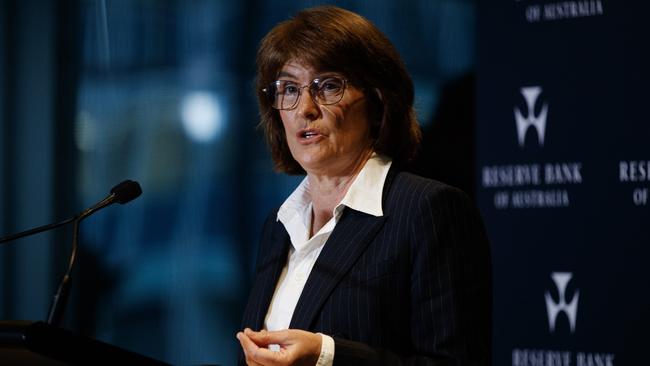RBA gets economy in fighting shape to confront global uncertainty
Reserve Bank of Australia governor Michele Bullock has signalled a willingness to act boldly if events demand it.

The RBA has successfully contained inflation without trampling on employment or having to engineer a recession, giving the economy its best chance of meeting the new threats that are now present globally.
In a massive understatement this week, the head of the Reserve Bank of Australia, Michele Bullock, described the coming together of historically low unemployment of around 4.0% and the coolest inflation numbers in nearly four years as “so far so good”. Never one to blow her own horn, Bullock will know that beating back the biggest inflation surge in four decades while keeping the lights on across the economy is a significant achievement.
More importantly, it’s happened in the nick of time.
While financial markets around the world have recovered the ground lost to the chaos around trade in April, the danger posed by tariffs is far from over. Damage to business confidence and economic activity in the world’s major economies is already visible, and can get worse.
Business leaders and investment heads know that the current relative calm in markets is the eye of a storm that could quickly rage again if trade talks break down and geopolitical developments worsen.
That’s why the RBA cut interest rates on Tuesday, while also telling money markets that it had seriously considered a blockbuster 50-basis-point reduction.
It also signalled that more cuts are probably in the pipeline.
The RBA board choosing a smaller 25-basis-point cut “doesn’t rule out that we might need to take action in the future,” Bullock said at a press conference.
On balance, the central bank feels that even as tariffs add to inflation, trade uncertainty and chaos around policy announcements will result in disinflation as growth sags.
The trade war is potentially so disruptive it could sap global growth well before it fans a resurgence in inflation internationally.
Bullock’s policy guidance was a welcome change from the tentativeness and short horizons that have marked her time as head of the bank. She is signalling a willingness to act boldly if events demand it. That’s reassuring given what might be ahead for the world economy.
It’s not just the trade war that is worrying, the US budget is also continuing to deteriorate, a fact highlighted by Moody’s downgrade of the US sovereign credit rating. The downgrade confirmed what everybody already knew, which is that the US fiscal position is in decline despite Elon Musk’s efforts to slash spending.
The budget situation puts a spotlight on rising US bond yields and the ability of the US government to service debt. While that threshold has not been breached, a loss of investor confidence in this space would be catastrophic for the world economy.
For the RBA, there is still glass it can break in case of emergency. Most economists expect another two or three rate cuts this year. The RBA has cleared a path for cuts by forecasting continued low inflation over the next year.
For those thinking the worst of the global storm has passed, and that the Trump administration will fuel a new phase of recovery in the US, the words this week of JPMorgan’s chief executive, Jamie Dimon, provide sobering insight into the mood on Wall Street. He warned that the scaled-backed US tariff agreements announced in recent weeks were still “pretty extreme”, adding that there was an “extraordinary amount of complacency” in markets about the policies being pursued by Washington. More worryingly, he warned that the world’s central banks might not be able to do much about an economic landscape marked by rising inflation due to tariffs, and falling confidence and growth.
The RBA has examined a number of scenarios that may play out in the world economy, with Bullock not ruling out a recession in Australia if the worst outcomes should emerge. It’s good that the RBA is being honest about the outlook and now offering meaningful guidance to markets. Most importantly though, Australian economic fundamentals look solid, so there’s scope to cushion the economy if world growth stalls.
The Wall Street Journal




To join the conversation, please log in. Don't have an account? Register
Join the conversation, you are commenting as Logout